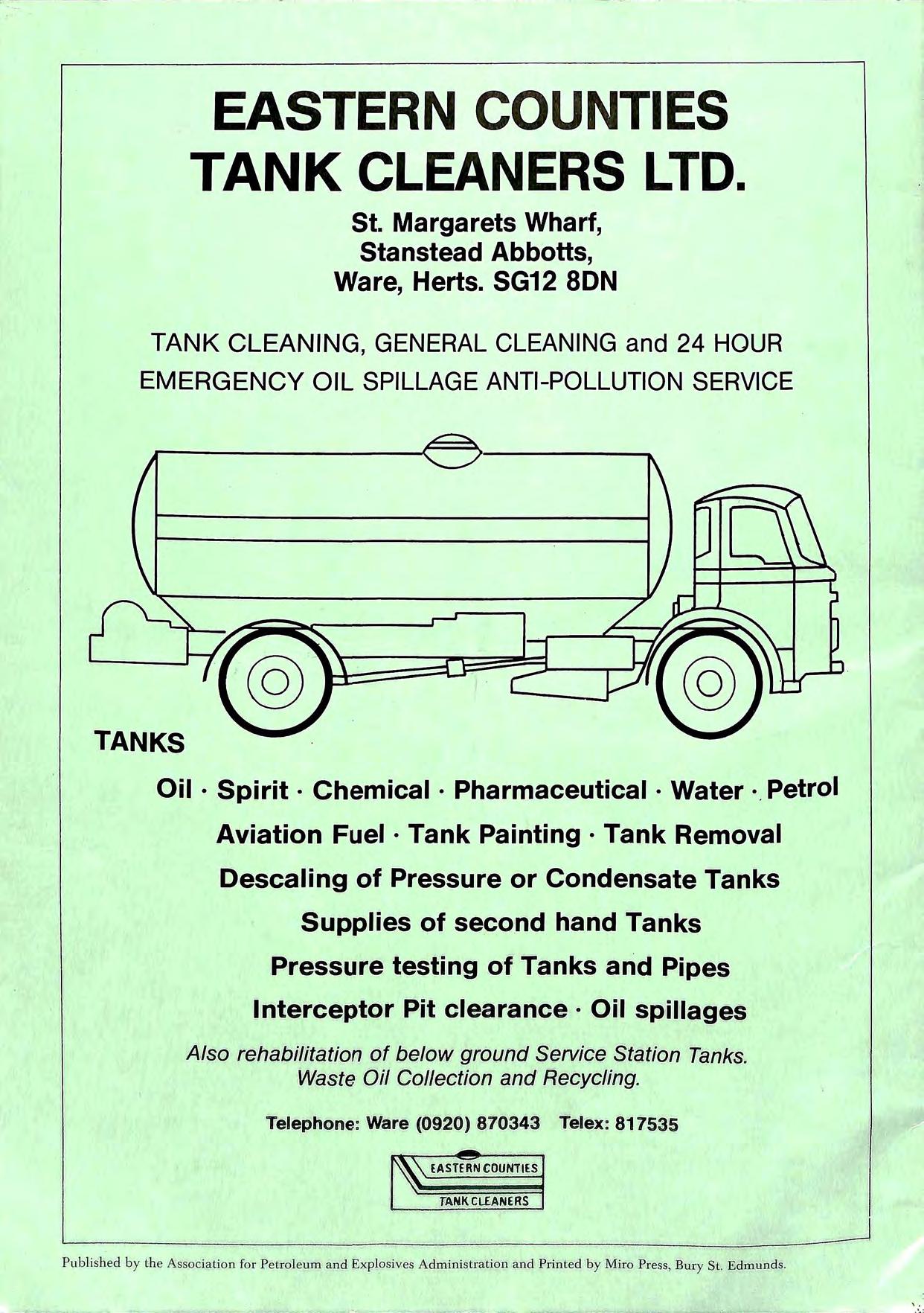Journal of the Association for "": Petroleum and "" Explosives Administration





DUring the past 2 years a different type of drive belt has appeared on forecourt petrol dispensers. The name is Tab-Link, and its unique polyester/polyurethane construction enables this belt to last a minimum of six times longer than conventional V-belts. It's easier to service, as one reel enables the service engineer to up any length of belt to SUit all pump assemblies, thereby greatly reducing the stock carried.
When it comes to the manufacture of pump equipment a simpler. design is possible using Tab-Link, as the tensioning and sliding adjustment systems used with conventional drive belts aren't needed. Tab-Link is in successful use in petrol dispensers throughout Britain, including those serviced by Pump Maintenance Limited, and built by Avery-Hardoll Ltd. ,Tokheim Ltd. and Ferranti Ltd.


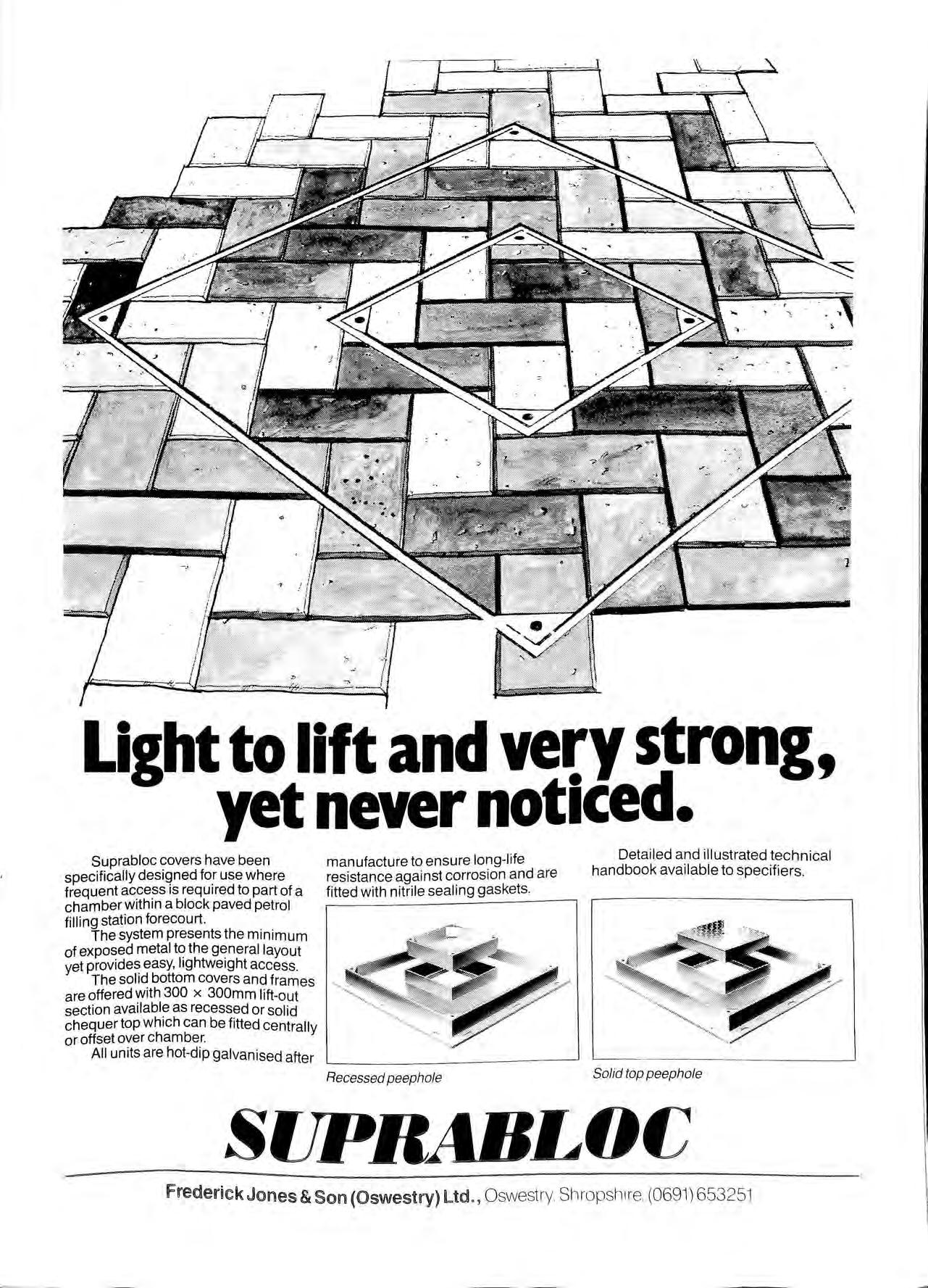
Suprabloc covers have been specifically designed for use where frequent access is required to part of a chamber within a block paved petrol filling station forecourt
The system presents the minimum of exposed metal to the general layout yet provides easy, lightweight access
The solid bottom covers and frames are offered 300 x 300mm lift-out section available as recessed or sol id chequer top which can be fitted centrally or offset over chamber
All units are hot-dip galvanised after

Once floated on the oil/water surface, the bucket filter allows oil into the collection chamber by gravity feed . Water cannot pass through the filter and therefore only water free , reusable or resalable oil is collected . Thus saving on expensive tanker cleaning, and eliminating the possibility of oil overspill into neighbouring watercourses.
available: Surface Samplers for keeping a check on quantity of oil in interceptor.


Honorary Secretary: Mr. B. D. Taylor, Bedfordshire County Cou '1l,
Opinions expressed in this Journal are not necessarily the views of the Association
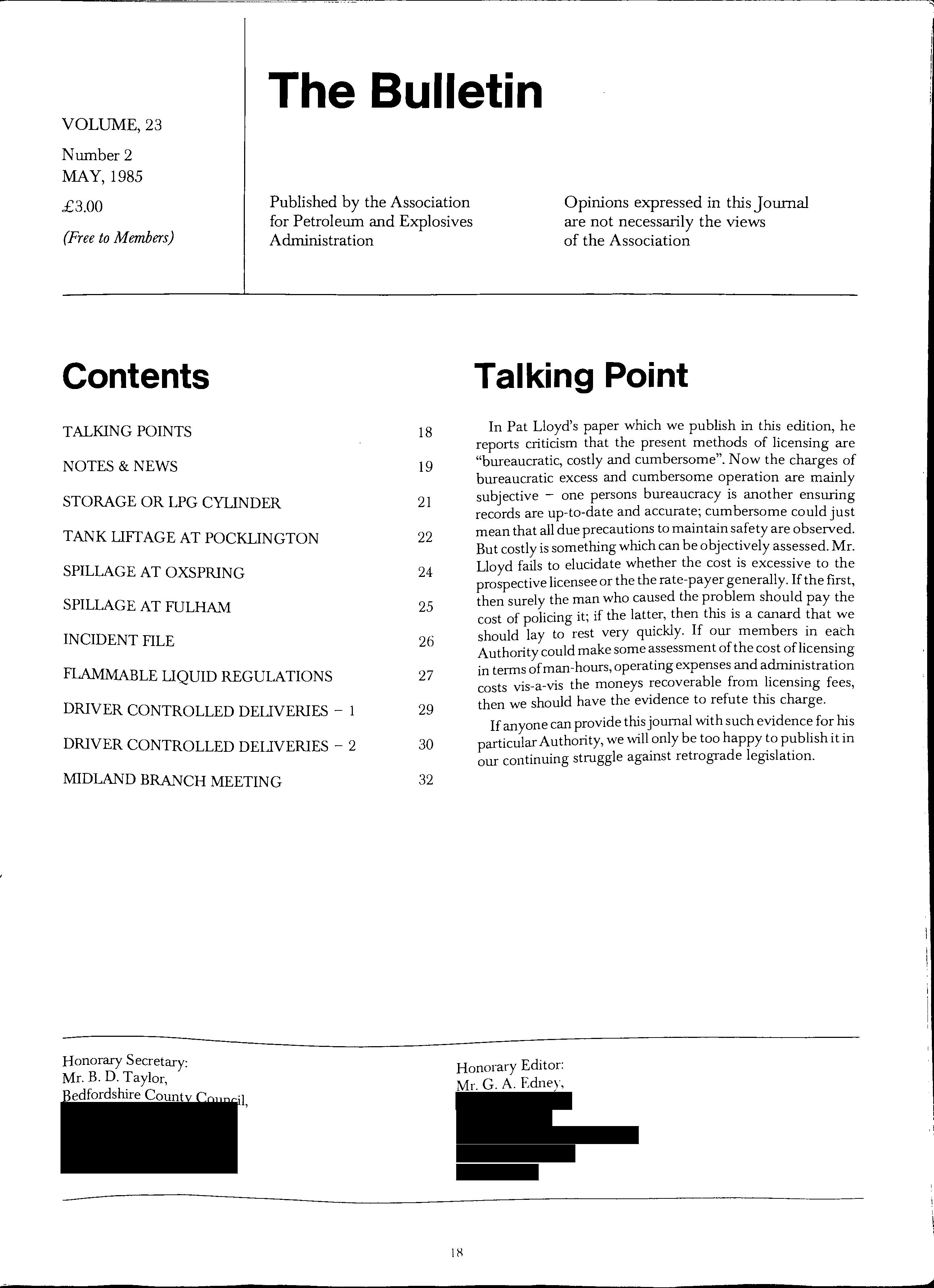
In Pat Lloyd's paper which we publish in this edition, he reports criticism that the present methods of licensing are "bureaucratic, costly and cumbersome". Now the charges of bureaucratic excess and cumbersome operation are mainly subjective one persons bureaucracy is another ensuring records are up-to-date and accurate; cumbersome could just mean that all due precautions to maintain safety are 0 bserved. But costly is something which can be objectively assessed. Mr. Lloyd fails to elucidate whether the cost is excessive to the prospective licensee or the the rate-payer generally. If the first, then surely the man who caused the problem should pay the cost of policing it; if the latter, then this is a canard that we should lay to rest very quickly. If our members in each Authority could make some assessment of the cost oflicensing in terms of man hours, operating expenses and administration costs vis-a-vis the moneys recoverable from licensing fees, then we should have the evidence to refute this charge.
If anyone can provide this journal with such evidence for his particular Authority, we will only be too happy to publish it in our continuing struggle against retrograde legislation.
Honorary Editor: Mr. G. A. Edney,
The Council of the Association has been in correspondence with the HSE over the proposed Exemption Certificates covering the pilot trials on DCD. Specifically it asked to have control of the pilot scheme vested with the Petroleum Licensing Authorities of the site concerned. In reply, the HSE have said that it was the intention to have the trials monitored jointly by the HSE, the Petroleum Licensing Authority and, where necessary, the District Council. However, the question of overall control is still unclear, and the matter is to be referred to the HSE's legal authorities.
The Council has also been discussing with the HSE, the problem, as it sees it, of declining standard of enforcement of the Tanker Regulations at petroleum filling stations. It has received an assurance that the HSE are committed to the view that the Licensing Authority should enforce all of the RegUlations at filling stations. However, with the imminence of Ammending Regulations to the Tanker Regulations, changes to the Enforcing Authority Regulations and the possible reorganisation of petroleum licensing as a whole, it was thought that any change would be premature at the moment.
Two members of the Association's Council will be attending the ITSA Conference at Invemess,june 17th-20th and would be pleased to meet any members who are there. They are especially keen to meet any members from Scotland with a view to establishing a Scottish Branch. Barry Lowe and ran N aime (who will be found on the Gilbarco stands 8 and 9) look forward to seeing any friends, old or new.
The APEA Southern Branch is arranging a visit to the Esso Refinery at Fawley this summer, and the Branch Secretary would like to hear from any member who would be interested in joining this visit.
Two errors have been drawn to the attention of the Council:
Page H, Section H.4(i) delete "(see 9.2)"
Inside Back cover Heading, delete "Acts"
David CT. Eves has been named Chief Inspector of Factories by the Health and Safety Executive in succession to Jim Hammer, recently appointed Deputy Director General of the HSE.
Mr Eves took up his new post at the beginning of year. HE' was prE'viously a Deput y Chief Inspector of Factones WIth rE'sponsibilities for the area offices of the Factory Inspectorate III the southern half of Great Blitain, plus liaison with policy branchl's of the Executive on hazardous substances and o\"('rall control of staff, resources and planning for the Inspect{)rate.
M r Ev(·s joinf'd tilt' Inspectorate in I and from 19H 183 II(' was IH'ad of the Executive's planning Branch.
A completely revised list of electrical apparatus certified by the British Approvals Service for Electrical Equipment in Flammable Atmosphere (Baseefa) has been published by the Health and Safety Executive.
'Baseefa list 1984: Certified and approved electrical equipment contains over 350 pages and more then 4,000 entries. It is available for £7.00 from HSE Sales Point, Room 414, St Hugh's House, Stanley Precinct, Bootle (051-951 4000).
Proposed new Regulations, recently published, seek to overcome the shortCOmings of existing legislation, which confines itself to mines, quarries and those premises which come under the Factories Act. Instead, most of the proposed Regulations will apply to all work places.
Parts I and II of the Regulations deal with the construction of electrical systems and the selection and use of equipment for all industries. These proposals are dealt with in the Consultative Document "Draft Electricity at Work Regulations 198-, Draft Approved Code of Practice and Guidance Note" available from HM Stationery Office price £3. '
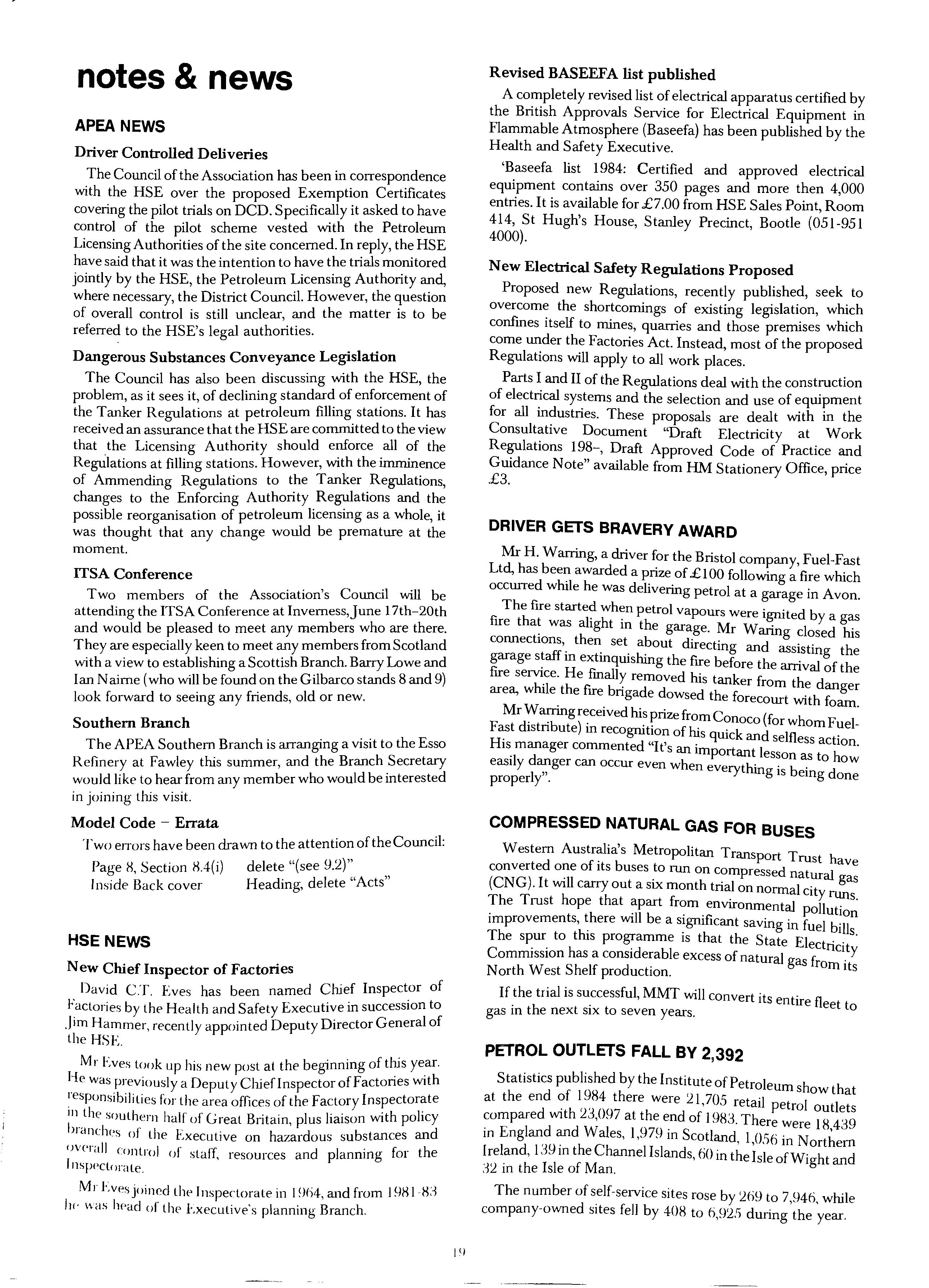
Mr H. Warring, a driver for the Bristol company, Fuel-Fast Ltd, has beer: awarded a prize of £100 follOwing a fire which occurred while he was delivering petrol at a garage in Avon.
The fire started when petrol vapours were' 't d b fi h I· h . Igru e y a gas Ire t was a Ig t ill the garage. Mr Waring closed his connectIOns, then set about directing and t' h aff asSIS illg t e garage ill extinquishing the fire before the arrival of the fire service. He fmally removed his tank f h d hil h fi b er rom t e anger area, w e.t e Ire rigade dowsed the forecourt with foam.
Mr "! his prize from Conoco (for whom FuelFast distnbute) ill recognition of his quO k d Ifl H · IC an se ess actIOn IS manager commented "It's an import t I '1 d an esson as to how easl y anger can occur even when everythi . b . I " ng IS eillg done proper y .
Western Australia's Metropolitan Transport T t h d rus ave converte one of ItS buses to run on compressed nat al (CN G). I t will carry out a six month trial on normal r!:s The Trust hope that apart from environmental poll . t th '11 b '. utJon Improvemen s, ere WI e a slgmficant saving in fuel bills The spur to this programme is that the State Elect C h 'd bl nCIty ommlSSlOn as a conSl era e excess of natural gas fro North West Shelf production. m Its
If the trial is successful, MMT will convert its ent' fl Ire eet to gas ill the next SIX to seven years.
Statistics published by the Institute ofPetroleu h h m s owt at at the end of 1984 there were 21,705 retail pet I I d . h 23 mr h ro out ets compare WIt " / at t e end of 1983. There were 18 439 in England and Wales, 1,979 in Scotland I Nth' , . , " ill or ern Ireland, 139 III the Channel Islands, 60 in the Isle ofWi ht and 32 in the Isle of Man. g
The number of self-service sites rose by 209 to 7,946, while company-owned sites fell by 408 to fi,92!l during the year.
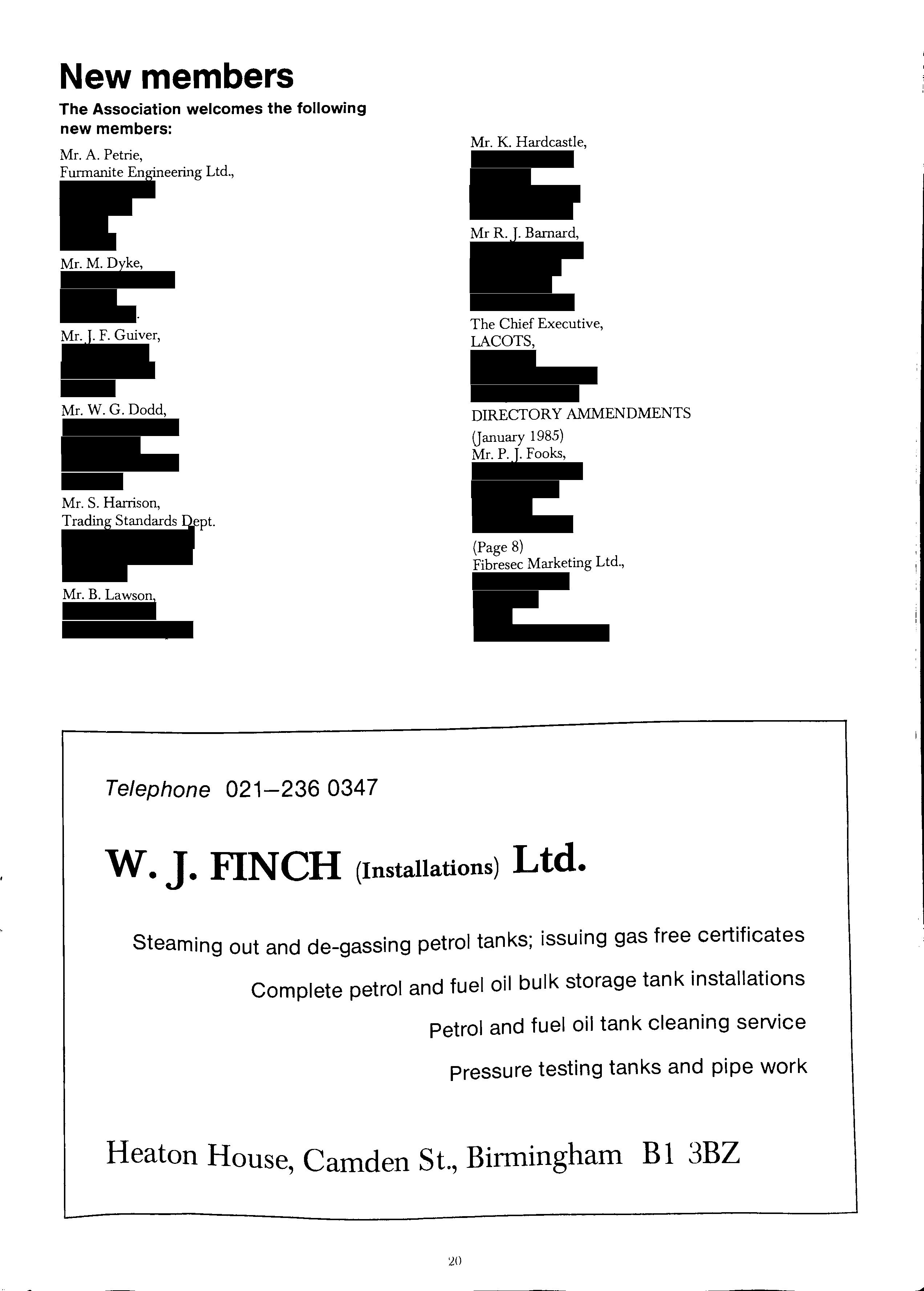
A divergence of views between a county fire authority and a city cOlmcil environmental health department over the manner of storage of small quantities of Calor gas in the shop area of a petrol service station led to the issue being considered by an industrial tribunal.
A Derby City Council environmental health department inspector had issued a notice barming the storage of gas cylinders on the forecourt outside the shop, but the inspector said a few cylinders could be stored inside. The Chief Fire Officer for the county disagreed, saying that they should only be stored in the open air.
Hearing the appeal against the notice, a Leicester tribunal considered the following facts. Before storing any Calor gas, the garage owner had asked the fire authority for its requirements as to storage. He received a letter from them with details of what was necessary they were to be stored at the side of the garage premises in a 'cage' of metal palings within a lockable stockade. These instructions were complied with, so far as the majority of the Calor gas cylinders was concerned, and about this there was no dispute.
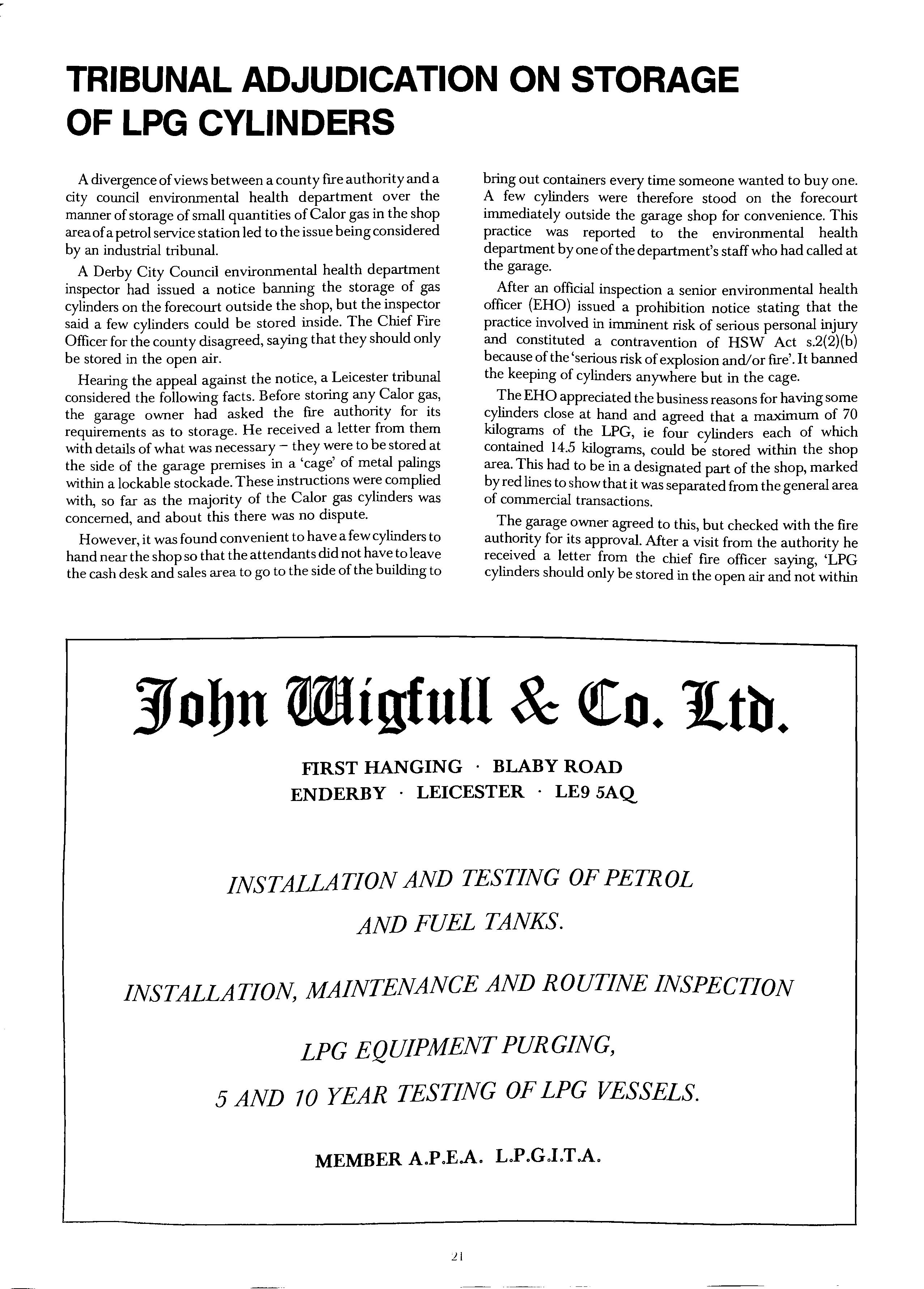
However it was found convenient to have a few cylinders to hand near the shop so that the attendants did not have to leave the cash desk and sales area to go to the side of the building to
bring out containers every time someone wanted to buy one. A few cylinders were therefore stood on the forecourt immediately outside the garage shop for convenience. This practice was reported to the environmental health department by one of the department's staff who had called at the garage.
After an official inspection a senior environmental health officer (EHO) issued a prohibition notice stating that the practice involved in imminent risk of serious personal injury and constituted a contravention of HSW Act s.2(2)(b) because of the 'serious risk of explosion and!or fire'. It banned the keeping of cylinders anywhere but in the cage.
The EHO appreciated the business reasons for having some cylinders close at hand and agreed that a maximum of 70 of the LPG, ie four cylinders each of which contamed 14.5 kilograms, could be stored within the shop area. had to be in a designated part of the shop, marked by red hnes to show that it was separated from the general area of commercial transactions.
The garage owner agreed to this, but checked with the fire for its approval. Mter a visit from the authority he rec:lved a letter from the chief fire officer saying, 'LPG cylmders should only be stored in the open air and not within
the shop as at present because a leak from one of the cylinders would cause a build-up of gas which could possibly result in an explosion occurring'. Notice of appeal against the prohibition notice was therefore given.
At the tribunal hearing, the HSE Guidance Note CS4, The Keeping of LPG in Cylinders and Similar Containers, was produced as evidence of the hazard of forecourt storage. This says that the cylinders should not be kept near sources of petrol and flammable materials (although the tribunal noted that this restriction in fact only applied to quantities of 50 kilograms and more); also that LPG should not be stored immediately adjacent to a building. In a few other minor respects, the tribunal noted, the storage of cylinders on the forecourt contravened safety recommendations.
The EHO argued that although the petrol pump itself was about six metres from the place where the cylinders had stood on the forecourt, the flexible hose attached to the pumps through which petrol is delivered was about five metres long. He considered this posed a serious hazard.
A representative of the Calor Gas organisation gave evidence and satisfied the tribunal that the dangers of forecourt storage were minimal as the cylinders are 'well made and well tested and of high quality steel'. But he conceded that although it was unlikely, it was possible that they could crack in the event of an accident.
During the hearing, the fire authority gave a statement to the garage owner withdrawing its previous objections to the storage of a small quantity (70 kilograms) ofLPG in the shop area.
Having considered the evidence, and in view of the fire authority's change of view during the hearing, the tribunal concluded that the order was not unreasonably made because the departures from the provisions of the Guidance Note did create a risk albeit a small one. In affirming the prohibition notice, the tribunal observed that if the garage owner thought that he had been misled by the fire authority, it would be open to him to seek a review of the tribunal's decision. Be decided not to do this and subsequently began storing the few cylinders he wished to have to hand in the shop as suggested.
At about 3.00 pm on Monday the 19 November 1984, Mr Pickup of the above reported that one of their 12,000 gallon capacity underground tanks containing petroleum spirit had lifted out of the ground.
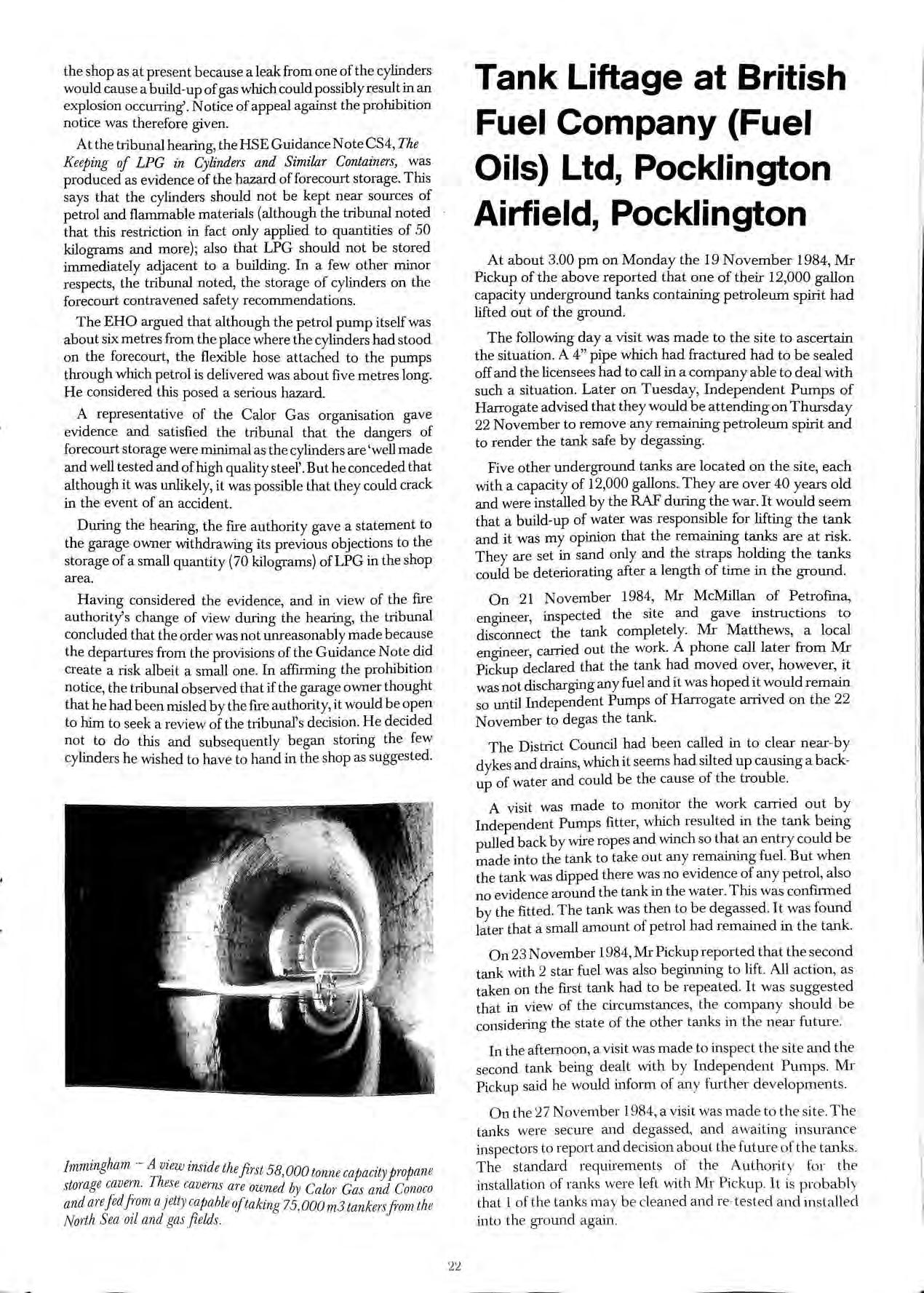
The following day a visit was made to the site to ascertain the situation. A 4" pipe which had fractured had to be sealed off and the licensees had to call in a company able to deal with such a situation. Later on Tuesday, Independent Pumps of Harrogate advised that they would be attending on Thursday 22 November to remove any remaining petroleum spirit and to render the tank safe by degassing.
Five other underground tanks are located on the site, each with a capacity of 12,000 gallons. They are over 40 years old and were installed by the RAF during the war. It would seem that a build-up of water was responsible for lifting the tank and it was my opinion that the remaining tanks are at risk. They are set in sand only and the straps holding the tanks could be deteriorating after a length of time in the ground.
On 21 November 1984, Mr McMillan of Petrofma., engineer, inspected the site and gave instructions to disconnect the tank completely. Mr Matthews, a local engineer, carried out the work. A phone call later from Mr Pickup declared that the tank had moved over, however, it was not discharging any fuel and it was hoped it would remain so until Independent Pumps of Ban-ogate arrived on the 22 November to degas the tank.
The District Council had been called in to clear near by dykes and drains, which it seems had silted up causing a backup of water and could be the cause of the trouble.
A visit was made to monitor the work carried out by Independent Pumps fitter, which resulted in the tank being pulled back by wi.re ropes and winch so that an entry could be made into the tank to take out any remaining fuel. But when the tank was dipped there was no evidence of any petrol, also no evidence around the tank in the water. This was confmned by the fitted. The tank was then to be degassed. It was found later that a small amount of petrol had remained in the tank.
On 23 November 1984, Mr Pickup reported that the second tank with 2 star fuel was also begimling to lift. All action, as taken on the first tank had to be repeated. It was suggested that in view of the circumstances, the company should be considering the state of the other tanks in the near future.
In the afternoon, a visit was made to inspect the site and the second tank being dealt with b y Independent Pumps. Mr Pickup said he would inform of an y further developments.
lmminglwm .- A view inside t I fi ' 58 ne 1St ,000 tonne capaCity propane storage cavern. These caverns are owned b C I G d C 'Y a or as an onoco and are fed from aJetty capable oftaking 75,000 m3 tankers from the North Sea OIL and gas fields.
On the 27 November 1984, a visit was made to the site. The tanks were secure and degassed, and awaiting insurance inspectors to report and decision about the futur e of the tanks. The standard requirements of the Authority for the installation of ranks were left with Mr Pickup. It is probabl y that I of the tanks may be cleaned and re tested a nd install ed into the ground again.
 Pocklingham 72, 000 gallon tanks.
Po ckLin gton These tanks and four mor e insta lled in san d by RAF, 40 years ago. Each tank is strapp ed do w n with four wire ropes.
Pocklingham 72, 000 gallon tanks.
Po ckLin gton These tanks and four mor e insta lled in san d by RAF, 40 years ago. Each tank is strapp ed do w n with four wire ropes.
On Tuesday, 11 th December, 1984, a call for assistance was received at Fire Service Control stating that there had been a spillage of petroleum spirit at Blackmoor Terminal, Oxspring The terminal is used by Conoco as a distribution depot.
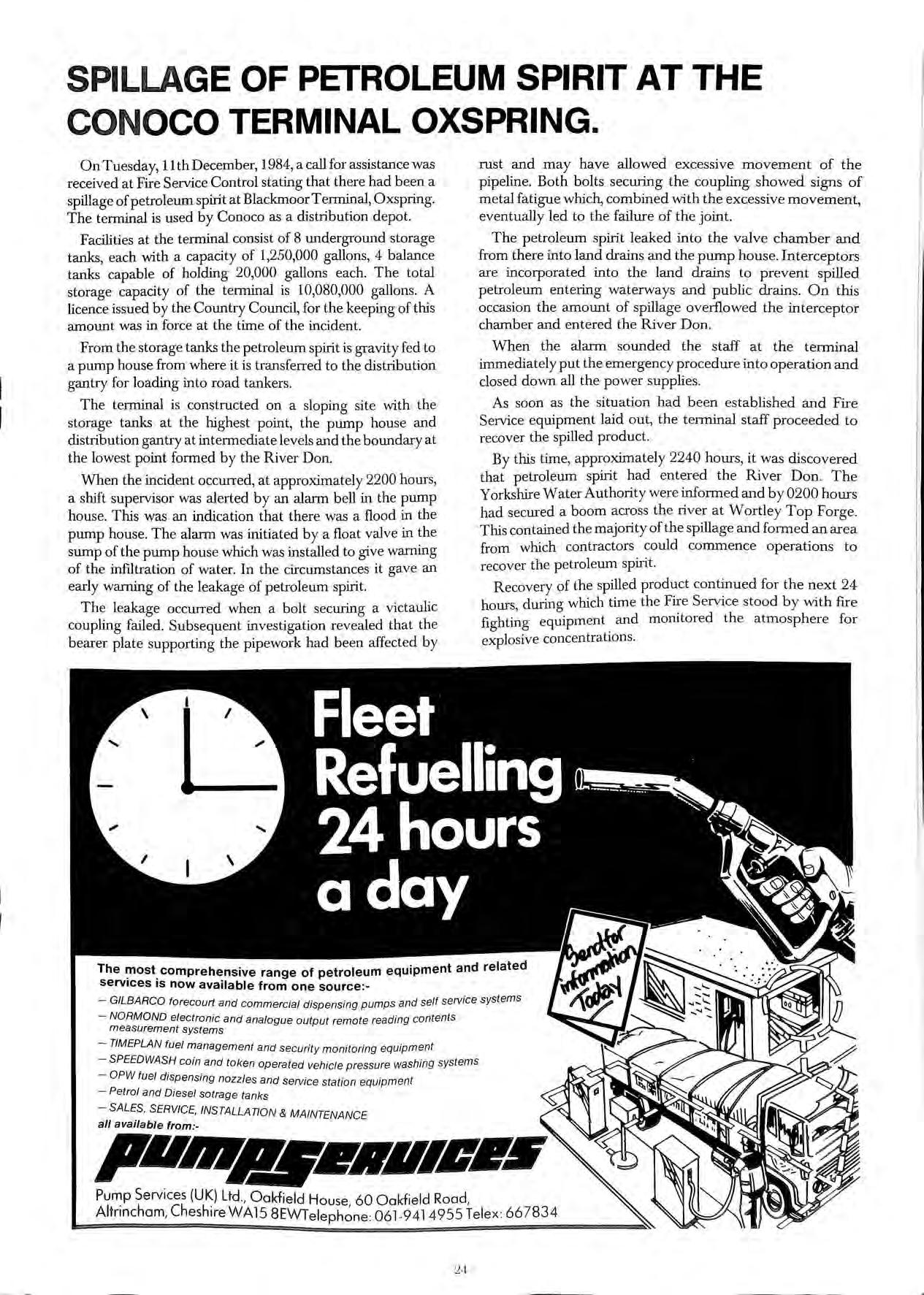
Facilities at the terminal consist of 8 underground storage tanks, each with a capacity of 1,250,000 gallons, 4 balance tanks capable of holding 20,000 gallons each. The total storage capacity of the terminal is 10,080,000 gallons . A licence issued by the Country Council, for the keeping of this amount was in force at the time of the incident.
From the storage tanks the petroleum spirit is gravity fed to a pump house from where it is transferred to the distribution gantry for loading into road tankers.
The terminal is constructed on a sloping site with the storage tanks at the highest point, the pump house and distribution gantry at intermediate levels and the boundary at the lowest point formed by the River Don.
When the incident occurred, at approximately 2200 hours, a shift supervisor was alerted by an alarm bell in the pump house. This was an indication that there was a flood in the pump house. The alarm was initiated by a float valve in the sump of the pump house which was installed to give warning of the infiltration of water. In the circumstances it gave an early warning of the leakage of petroleum spirit.
The leakage occurred when a bolt securing a victaulic coupling failed Subsequent investigation revealed that the bearer plate supporting the pipework had been affected by
rust and may have allowed excessive movement of the pipeline. Both bolts securing the coupling showed signs of metal fatigue which, combined with the excessive movement, eventually led to the failure of the joint.
The petroleum spirit leaked into the valve chamber and from there into land drains and the pump house. Interceptors are incorporated into the land drains to prevent spilled petroleum entering waterways and public drains On this occasion the amount of spillage overflowed the interceptor chamber and entered the River Don .
When the alarm sounded the staff at the terminal immediately put the emergency procedure into operation and closed down all the power supplies.
As soon as the situation had been established and Fire Service equipment laid out, the terminal staff proceeded to recover the spilled product.
By this time, approximately 2240 hours, it was discovered that petroleum spirit had entered the River Don. The Yorkshire Water Authority were informed and by 0200 hours had secured a boom across the river at W ortley T op Forge This contained the majority of the spillage and formed an area from which contractors could commence operations to recover the petroleum spirit.
Recovery of the spilled product continued for the next 24 hours, during which time the Fire Service stood by with fire fighting equipment and monitored the atmosphere for explosive concentrations.
An estimate of the spillage is given as 49,555 gallons 223,000 litres.
The amount recovered from the river was
The amount recovered from the pump house and interceptors was Total recovered Total lost
3,223 gallons 24,500 litres.
24,555 gallons 110,500 litres. 27,778 gallons 125,000 litres. 21,777 gallons 98,000 litres.
As a result of the investigation the company have been advised to:-
(a) replace all carbon steel bolts in the victaulic joints in the pipeline with high tensile steel bolts;
(b) tighten the bolts to the manufacturer's recommended torque;
(c) fit float valve warning devices at strategic points along the pipeline similar to the one in the pump house.
This they have agreed to do.
lt is significant to note that the pre-arranged emergency plan, prepared in conjunction with the fire service, worked perfectly and even with the massive spillage and subsequent gas cloud, ignition was avoided and a large proportion of spillage was recovered. Another feature which also proved to be a blessing in disguise was the weather. On the night of the incident it was extremely cold and there was a very heavy fog. This held the gas cloud to a very low level and restricted the area of the explosive range of the cloud to a minimum.
During the afternoon of Sunday 20th January 1985 a was docked at the wharf ofB.P. Terminal at Fulham: A delIvery of 950,000 litres of premium motor spirit was in progress using the ship's pump, via six inch pipe work to one of the nearby million gallon storage tanks.
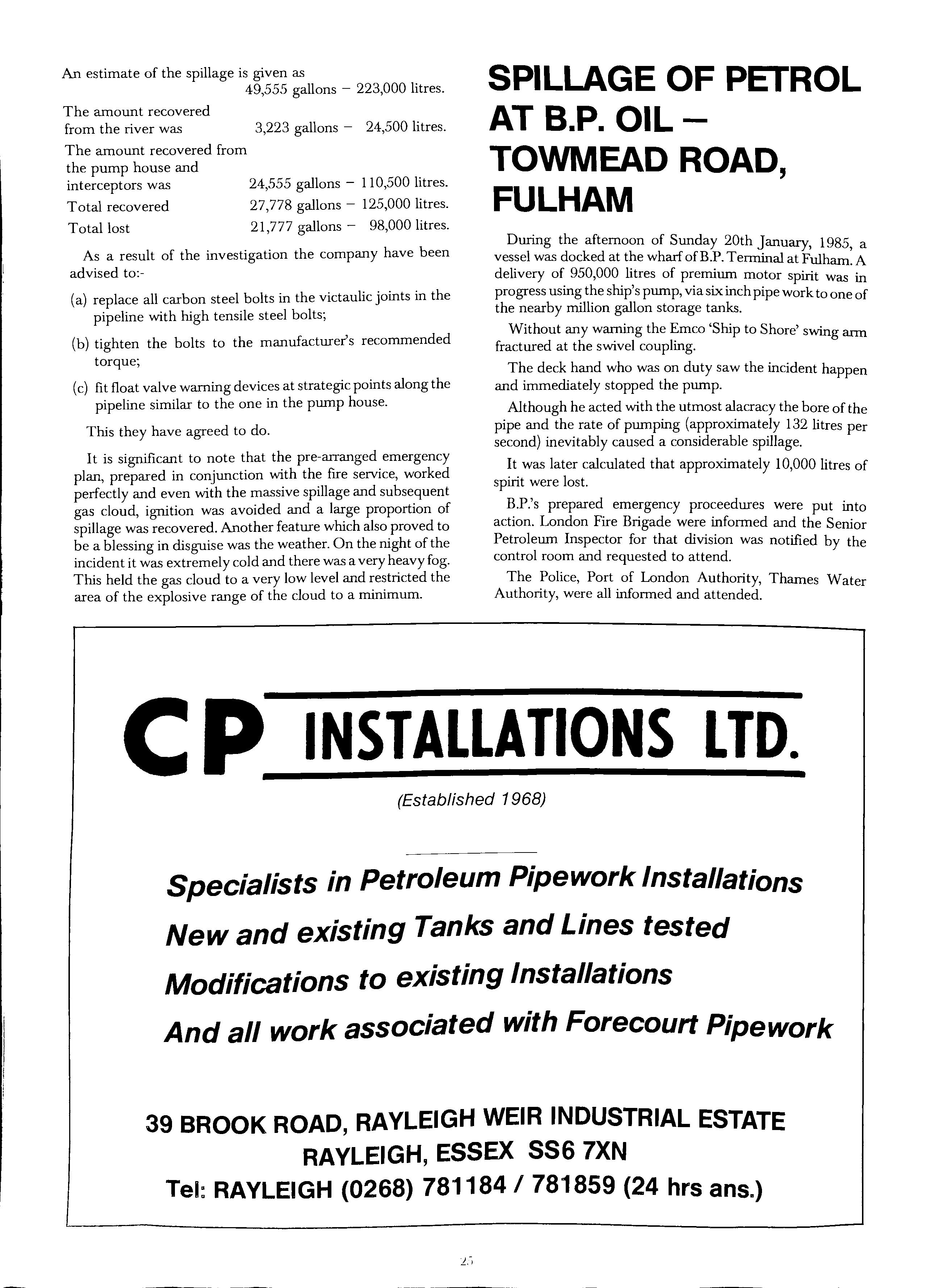
Without any warning the Emco 'Ship to Shore' Swing arm fractured at the swivel coupling.
The deck hand who was on duty saw the incident happen and immediately stopped the pump.
Although he acted with the utmost alacracy the bore of the pipe and the rate of pumping (approximately 132 litres per second) inevitably caused a considerable spillage.
It was later calculated that approximately 10,000 litres of spirit were lost.
B.P.'s prepared emergency proceedures were put into action. London Fire Brigade were informed and the Senior Petroleum Inspector for that division was notified by the control room and requested to attend.
The Police, Port of London Authority, Thames Water Authority, were all informed and attended.
The jetty and the deck of the ship were hosed down immediately following the incident and that reach of the river was closed until the extent of the contamination could be established.
Nearby potential danger sources such as Lots Road Power Station were warned to take any necessary precautions.
Fortunately, the strong sleet and wind helped to disperse the slicks and within an hour or so everyone agreed, that the danger had passed and the liver was re-opened.
The casting which fractured was of cast aluminium, and has been sent for scientific examination to determine the cause of failure. The results have not yet been received, but the coincidence of recent fractured gas pipes certainly makes one consider the probability of the extreme temperature being related to the cause.
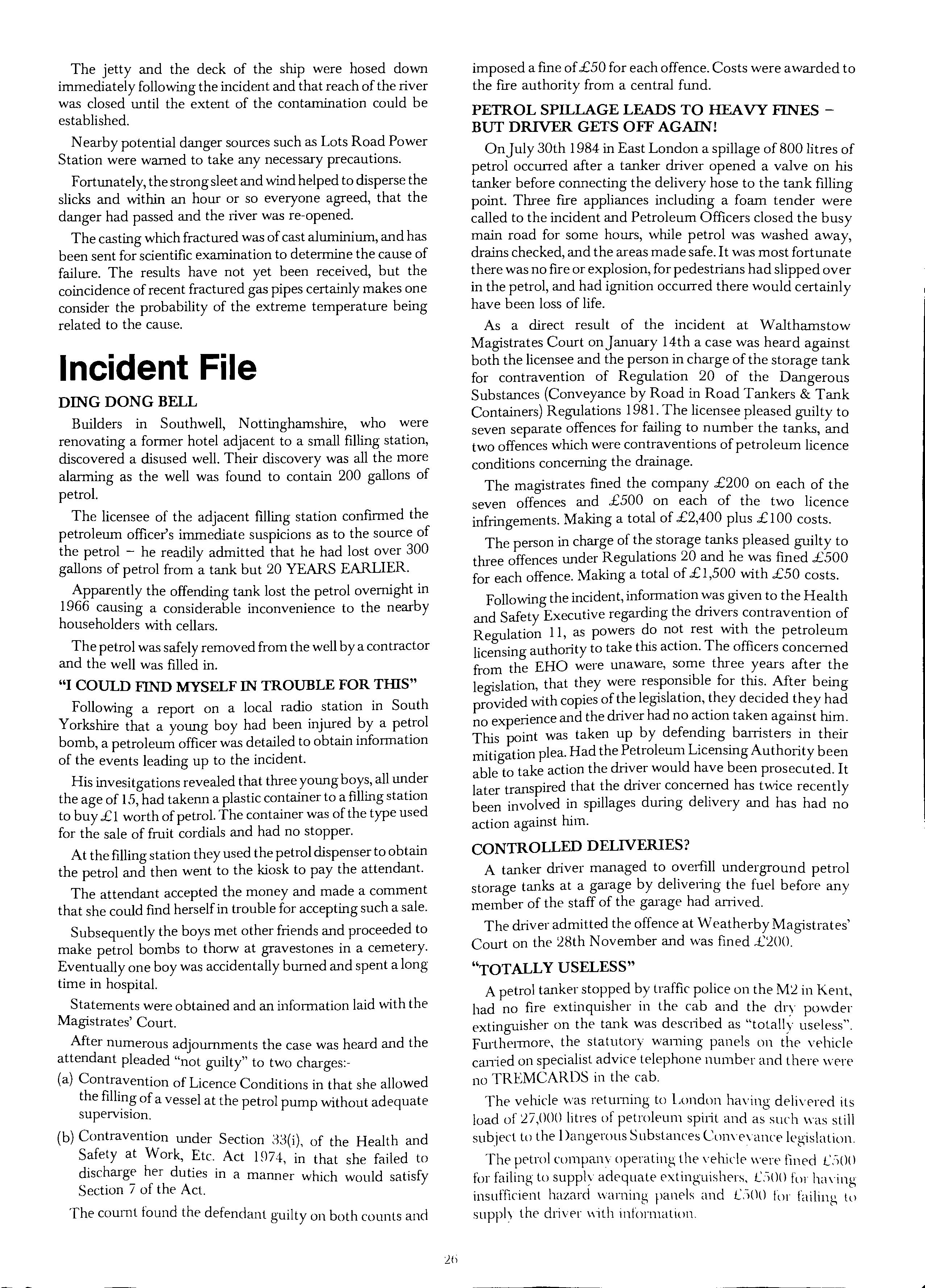 DING DONG BELL
DING DONG BELL
Builders in Southwell, N ottingharnshire, who were renovating a former hotel adjacent to a small filling station, discovered a disused well. Their discovery was all the more alarming as the well was found to contain 200 gallons of petrol.
The licensee of the adjacent filling station confmned the petroleum officer's immediate suspicions as to the source of the petrol he readily admitted that he had lost over 300 gallons of petrol from a tank but 20 YEARS EARliER.
Apparently the offending tank lost the petrol overnight in 1966 causing a considerable inconvenience to the nearby householders with cellars.
The petrol was safely removed from the well by a contractor and the well was filled in.
FollOwing a report on a local radio station in South Yorkshire that a young boy had been injured by a petrol bomb, a petroleum officer was detailed to obtain information of the events leading up to the incident.
His invesitgations revealed that three young boys, all under the age of 15, had takenn a plastic container to a filling station to buy £ 1 worth of petrol. The container was of the type used for the sale of fruit cordials and had no stopper.
At the filling station they used the petrol dispenser to obtain the petrol and then went to the kiosk to pay the attendant.
The attendant accepted the money and made a comment that she could fmd herself in trouble for accepting such a sale.
Subsequently the boys met other friends and proceeded to make petrol bombs to thorw at gravestones in a cemetery. Eventually one boy was accidentally burned and spent a long time in hospital.
Statements were obtained and an information laid with the Magistrates' Court.
Mter numerous adjournments the case was heard and the attendant pleaded "not guilty" to two charges:-
(a) Contravention of Licence Conditions in that she allowed the of a vessel at the petrol pump without adequate supervISIon.
(b) Contravention under Section 33(i), of the Health and Safety at Work, Etc. Act 1974, in that she failed to discharge her duties in a manner which would satisfy Section 7 of the Act.
The cournt found the defendant guilty on both counts and
imposed a fme of £50 for each offence. Costs were awarded to the fire authority from a central fund.
OnJuly 30th 1984 in East London a spillage of 800 litres of petrol occurred after a tanker driver opened a valve on his tanker before connecting the delivery hose to the tank filling point. Three fire appliances including a foarn tender were called to the incident and Petroleum Officers closed the busy main road for some hours, while petrol was washed away, drains checked, and the areas made safe. It was most fortunate there was no fire or explosion, for pedestrians had slipped over in the petrol, and had ignition occurred there would certainly have been loss of life.
As a direct result of the incident at Walthamstow Magistrates Court on January 14th a case was heard against both the licensee and the person in charge of the storage tank for contravention of Regulation 20 of the Dangerous Substances (Conveyance by Road in Road Tankers & Tank Containers) Regulations 1981. The licensee pleased guilty to seven separate offences for failing to number the tanks, and two offences which were contraventions of petroleum licence conditions concerning the drainage.
The magistrates fmed the company £200 on each of the seven offences and £500 on each of the two licence infringements. Making a total of £2,400 plus £ 100 costs.
The person in charge of the storage tanks pleased guilty to three offences under Regulations 20 and he was fmed £500 for each offence. Making a total of £1,500 with £50 costs.
Following the incident, information was given to the Health and Safety Executive regarding the drivers contravention of Regulation 11, as powers d? rest with the petroleum licensing authority to take this actIOn. The officers concerned from the EHO were unaware, some three years after the le 'slation, that they were responsible for this. Mter being with copies of t?e legislation, decided no experience and the driver had no actIon taken agamst him. This point was taken up by defending barristers in their mitigation plea. Had the Petroleum Licensing AuthOrity been able to take action the driver would have been prosecuted. It later transpired that the driver concerned has twice recently been involved in spillages during delivery and has had no action against him.
A tanker driver managed to overfill underground petrol storage tanks at a garage by delivering the fuel before any member of the staff of the garage had arrived.
The driver admitted the offence at Weatherby Magistrates' Court on the 28th November and was fined £200.
A petrol tanker stopped by traffic police on the M2 in Kent, had no fire extinquisher in the cab and the dry powder extinguisher on the tank was desoibed as "lotally useless". FurthelIDore, the statutory warning panels on the vehicle canied on specialist advice telephone number and there ,vere no TREMCARDS in the cab.
The vehicle was returning to London haVing delivered its load of 27,000 litres of petroleum Spilit and as such \vas still subject to the Dangerous Substances Conveyance legislation.
The petrol company operating the vehide were fined C:jO(l for failing to supply adequate extinguishers, C:jO() for having insufficient hazard warning panels and C:)OO for failing tu supply the driver ""ith information.
The Health and Safety Executive was faced with a multiplicity of legislation and guidance when it set out some time ago to review the existing controls for flammable liquids. One of the most important questions arising during the review was, and continues to be, what should be the future of the petroleum spirit licensing system currently operating under the Petroleum (Consolidation) Act 1928.

Draft proposals developed so far are still at a relatively early stage. They have yet to be discussed with industry, local authority associations and other interested parties on an informal basis; or to be considered in depth by the Health and Safety Commission's Advisory Committee on Dangerous Substances; or to be agreed by the Commission and approved for consultation on the formal basis required by the Health and Safety at Work etc Act 1974. Nevertheless, even with all these caveats, it would be useful to look into the content of those proposals as they stand at present.
The current intention is to propose general regulations with the objective of preventing danger to persons from any fire or explosion arising from flammable liquid. They will be broadly based, generally setting objectives which will be supported by approved codes of practice with the special legal status provided by section 17 of the HS W Act. As far as the 1928 Act is concerned, it is intended to propose the removal of the licensing system for petroleum spirit. The view taken so far is that, in general, it would not be appropriate for petroleum spirit to be treated differently from other highly flammable
liquids and that in future its keeping and use should be controlled under the general regulations and associated approved codes of practice. However, the speCial nature of the risk at petrol filling stati?ns members of the public have access could be SaId to Justify a notification system in support of the general regulations. Consequently, the proposals are planned to mcorporate requirements for the enforcing authority to be notified before the construction occupation and operation of a retail petrol filling station. would enable the enforcing authority to make reactive visits as appropriate and to exercise its powers of enforcement under the HSW Act where necessary.
The package of controls is also expected to include a detailed approved code of practice giving guidance on the of and operations at retail petrol filling stations. This would replace and bring up to date the Home Office Mode.l Code of of <?onstruction and Licensing Conditions for Petrol Filling Stations issued in 1968. A draft is being prepared with the aid of a working party contammg representatives from industry trades urn· ,ons, profeSSIOnal aSSOCIatIOns, petroleum licenSing authorities d an
In developing the draft proposals in this way, consideration has been given to the merits claimed for the petroleum s I· t F I d pmt Icensmg sys em. or examp e, It IS sai that licensing:(a) gives licensing authorities firm control of I· d premises, begmnmg when an application cor a I· d j' Icence IS ma e;
(b) identifies relevant premises, thereby allowing infonnation to be made available to the emergency services;
(c) brings confidence to licensees and persons using licensed premises that the authorities are satisfied with safety standards;
(d) has ensured a high standard of safety over a considerable number of years.
But consideration has also been given to criticisms made of the system. For example, it is argued that licensing:-
(a) is a bureaucratic, costly and cumbersome system which diverts scarce resources and expertise from other work to administer it;
(b) spreads available resources over all premises from the very small to the very large, irrespective of the standards of premises or the competence of occupiers, rather than allowing effort to be concentrated on premises where improvements in standards are required;
(c) gives rise to a false sense of security by appearing to transfer responsibility for safety from those responsible for the hazards (ie occupiers) to the authorities, with occupiers relaxing standards except when in direct contact with the authorities;
(d) is illogical and anomalous compared with the controls over other dangerous substances;
(e) may result in a number of authorities being responsible for enforcing health and safety legislation in one premises.
One further issue which will be of interest to APEA members is that of enforcement. In general, it is anticipated that enforcement should fall to the relevant enforcing authority for particular premises in accordance with the Health and Safety (Enforcing Authority) Regulations 1977, as
varied by the enforcement provisions in the Notification of Installations Handling Hazardous Substances Regulations 1982 and the forthcoming Control of Industrial Major Accident Hazards Regulations. However, enforcement at retail petrol filling stations may be more appropriate to upper tier local authorities where available experience and expertise in dealing with the subject is currently concentrated. Consideration will need to be given to this aspect during further development of the draft proposals.
In conclusion, the foregoing is not intended to be a detailed description or justification of the draft proposals. It merely highlights the developing approach to the review of the Petroleum (Consolidation) Act 1928 and raises particular issues which are likely to be of interest to APEA members. I need hardly add that these issues will be the subject of the infonnal discussions and fonnal consultations yet to come.
Further to your article appearing in the "Bulletin" Volume 23 No. 1 in your incident file and headed "Pressurising Petrol tanks", outlining an incident which was critical of a tank content gauge installed on a petrol station at Gallows Corner, we would like to make it perfectly clear, that the instrument described in the article, was not manufactured by N onnond Instruments Ltd. Yours faithfully
PETER NORFOLK, MANAGING DIRECTOR NORMOND INSTRUMENTS LTD. RICHMOND, SURREY
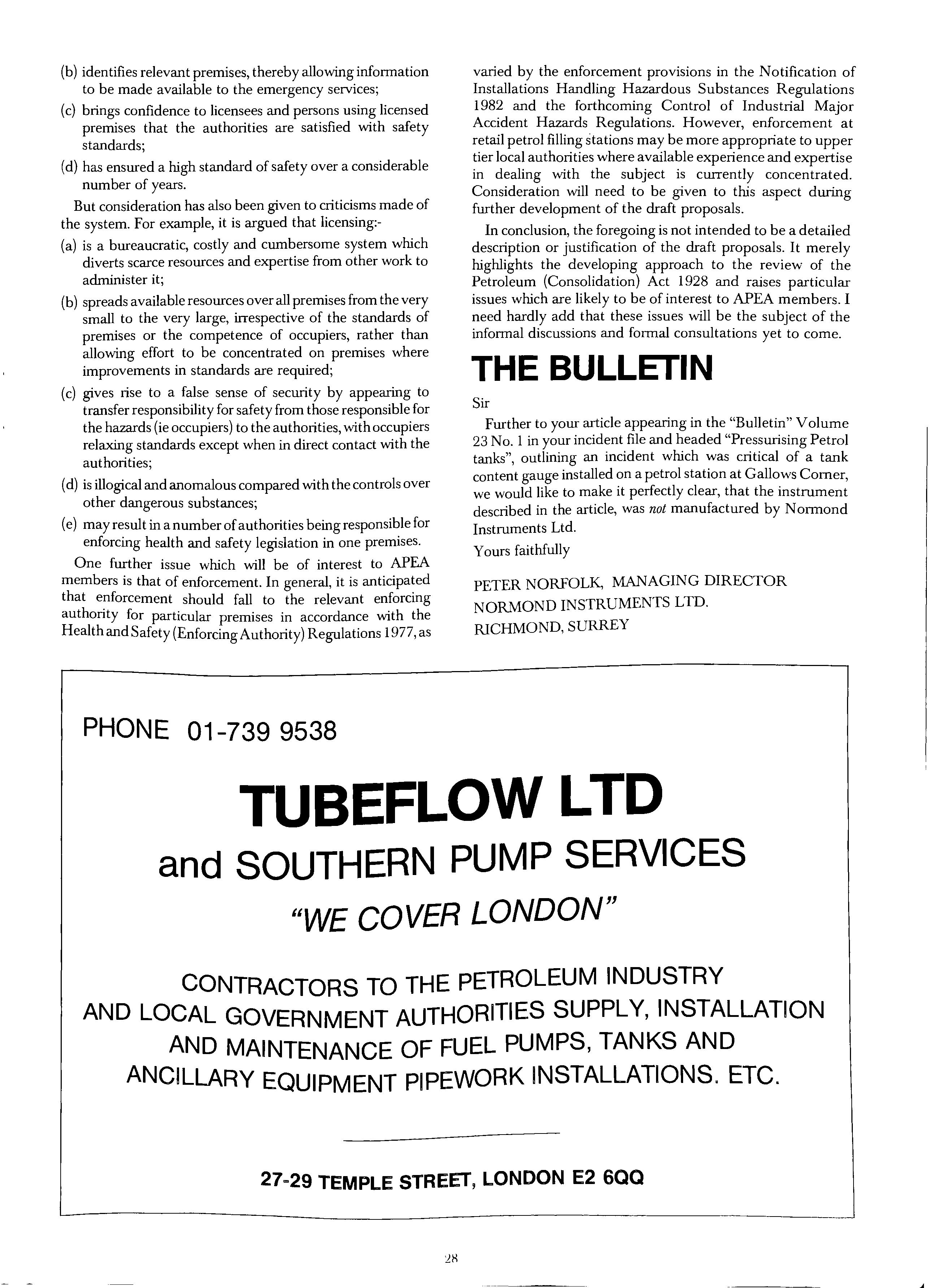
M. A. Simpson (Esso) - Chairman, Road Transport Committee, UKPIA.
Following discussions with the Health and Safety Executive (HSE) in 1983, UK Petroleum Industry Association (UKPIA) commenced drafting a Code of Practice for Driver Controlled Deliveries (DCDs). About a year ago The Bulletin (April 1984 Volume 22, Number 2) printed one of the early drafts of this Code without making clear the status of the document and without notifiying UKPIA of its intention to print it. UKPIA welcomed the opportunity to put DCDs into context at the APEA annual conference at Dunstable in September 1984. Following on from the presentation in September this article aims to develop the subject further by considering the benefits of a change in legilsation within the wider framework of a changing operating environment.
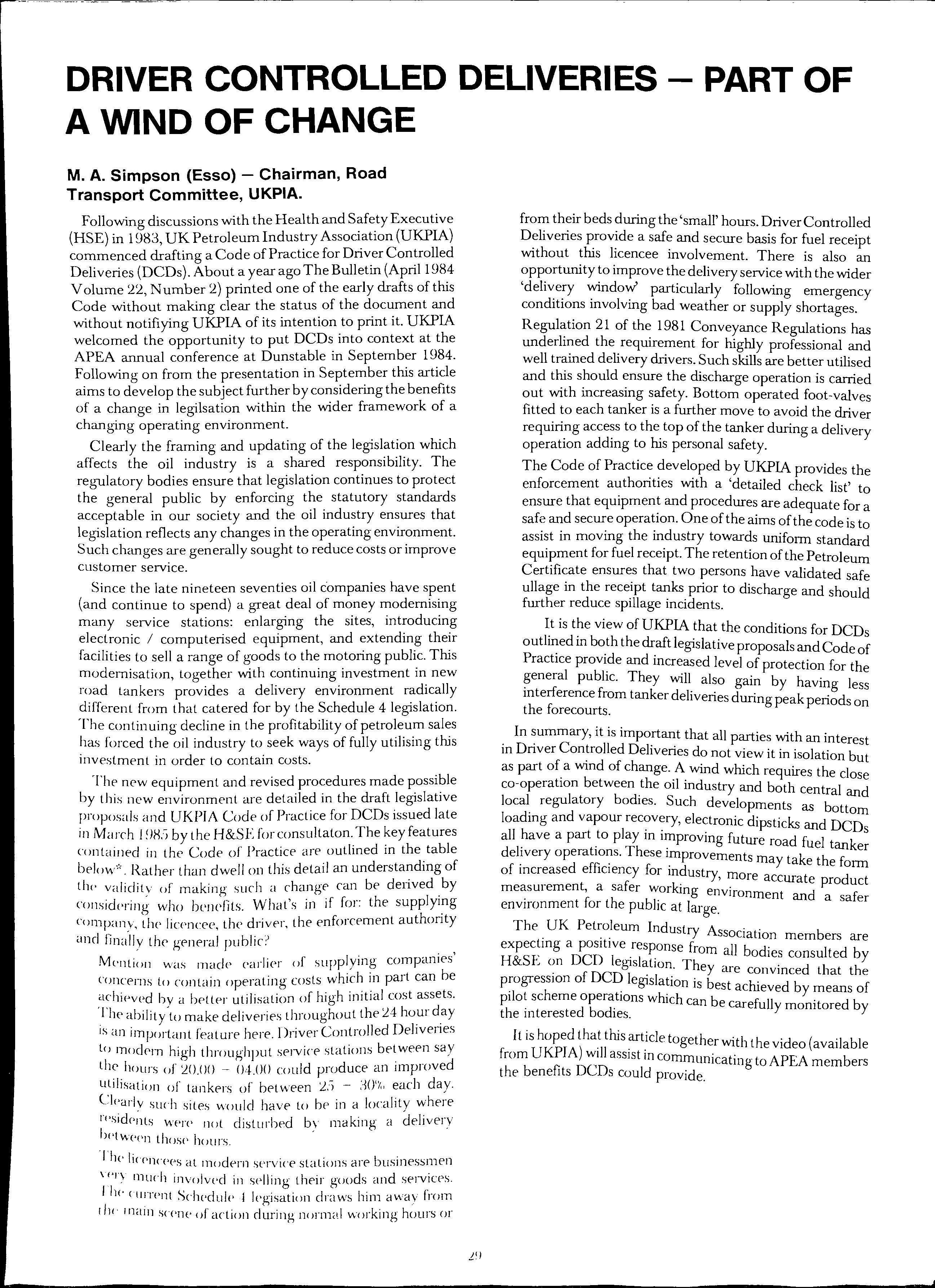
Clearly the framing and updating of the legislation which affects the oil industry is a shared responsibility. The regulatory bodies ensure that legislation continues to protect the general public by enforcing the statutory standards acceptable in our society and the oil industry ensures that legislation reflects any changes in the operating environment. Such changes are generally sought to reduce costs or improve customer service.
Since the late nineteen seventies oil companies have spent (and continue to spend) a great deal of money modernising many service stations: enlarging the sites, introducing electronic / computerised equipment, and extending their facilities to sell a range of goods to the motoring public. This modernisation, together with continuing investment in new road tankers provides a delivery environment radically different from that catered for by the Schedule 4 legislation. The continuing decline in the profitability of petroleum sales has forced the oil industry to seek ways of fully utilising this investment in order to contain costs.
The new equipment and revised procedures made possible by this new environment are detailed in the draft legislative proposals and UKPIA Code of Practice for DCDs issued late in March I m(1) by the H&SE for consultaton. The key features contained in the Code of Practice are outlined in the table below':'. Rather than dwell on this detail an understanding of tl1(> validity of making such a change can be derived .by considering who benefits. What's in if for: the company, the Iicpncee, the drivpr, the enforcement authonty and fina'lIy tIlE' general publiC?
M('Iltiull was made pariier ()f supplying companies' conCC:'IllS to C'Ontain operating costs which in part can be achipvpd by a bptter utilisation of high initial cost assets, The abilit /to make deliveries throughout the 24 d,ay is an important feature here, Dliver Controlled DelIvenes to modplll high throughput service stations ween say the hours uf 20,00 ()4,()() could produce an Improved utilisation of tankers of between '2:) ;·W'X, each day, Cipariv such sites would have to bp in a locality where rpsidp;llS WPI'(' n()t disturbed by making a delivery l)pt W('('n thos!' hours, '
Th(· licPIH'('PS at Jl1()dprn service stations an' businessmen vpry much involved ill splling their goods and services.
I 11<' cIJrrent Sclwdulpt legisati()n draws him away from ,/](" IIlain sn'np of action during n()nn,d working hours or
from their beds during the 'small' hours. Driver Controlled Deliveries provide a safe and secure basis for fuel receipt without this licencee involvement. There is also an opportunity to improve the delivery service with the wider 'delivery window' particularly following emergency conditions involving bad weather or supply shortages.
Regulation 21 of the 1981 Conveyance Regulations has underlined the requirement for highly professional and well trained delivery drivers. Such skills are better utilised and this should ensure the discharge operation is canied out with increasing safety. Bottom operated foot-valves fitted to each tanker is a further move to avoid the driver requiring access to the top of the tanker during a delivery operation adding to his personal safety.
The Code of Practice developed by UKPIA provides the enforcement authorities with a 'detailed check list' to ensure that equipment and procedures are adequate for a safe and secure operation. One of the aims of the code is to assist in moving the industry towards uniform standard equipment for fuel receipt. The retention of the Petroleum Certificate ensures that two persons have validated safe ullage in the receipt tanks prior to discharge and should further reduce spillage incidents.
It is the view of UKPIA that the conditions for DCDs outlined in both the draft legislative proposals and Code of Practice provide and increased level of protection for the ?"eneral public. They will also gain by haVing less Interference from tanker deliveries during peak periods on the forecourts.
In summary, it is important that all parties with an interest in Driver Controlled Deliveries do not view it in isolation but as part of. a wind of change. A wind which requires the close co-operation between the oil industry and both central d local regulatory bodies. Such developments as bot:m loading and vapour electronic dipsticks and all have a part to play In Improving future road fuel t k d I, t· Th ' an er e opera ese I,mprovements may take the form of Increased effiCiency for mdustry more ac t d " cura e pro uct measurement, a safer working environment and a safer environment for the public at large,
The UK Petroleum Industry Assocl'at' b ' , , Ion mem ers are expectmg a posItive response from all bodies consulted by H&SE DCD legislation, They are convinced that the of legislation is best achieved by means of pIlot scheme operations which can be carefull monitored b the interested bodies. y y
It is hoped tha,t this together with the video (available from UKPIA) Wlll assist 111 Communicating to APEA members the benefits DCDs could proVide,
clearly marked fill-pipes on storage tanks at Service Stations.
measuring device on storage tanks (other than dipstick).
fill pipe locks with different profIle keys. lighting, emergency telephone, fire extinguisher and sand available to driver.
Delivery control box to contain equipment at one point for driver.
road tanker to be fitted with bottom operated foot valves and emergency cut-off.
Service Station premises to be nominated or approved by local petroleum licencing authority.
Licencee to check for safe ullage and complete Petroleum Certificate. Driver to validate Certificate using measuring device.
Driver given information concerning premises in advance of delivery by Supplying company.
Driver trained to use new equipment and procedures with emphasis on action in case of emergency.
The views expressed are my own and do not necessarily express the policy of the Fire Authority.
I first became aware of the proposal for Driver Controlled Deliveries, now referred to in general as "D.C.D.s", in February 1984 when I was asked to comment on the Draft Code prepared by the u.K.P.lA.
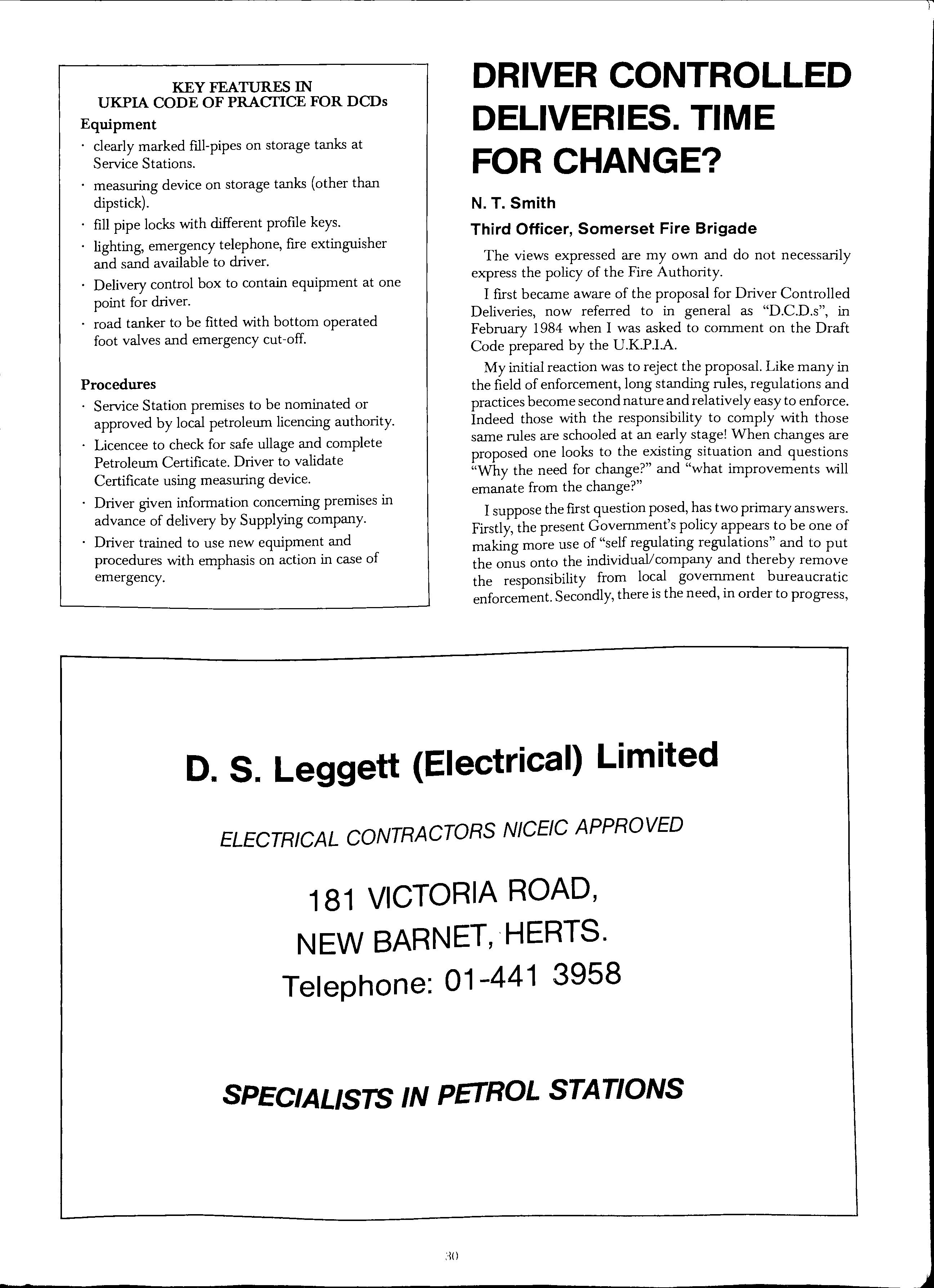
My initial reaction was to reject the proposal. Like many in the field of enforcement, long standing rules, regulations and practices become second nature and relatively easy to enforce. Indeed those with the responsibility to comply with those same rules are schooled at an early stage! When changes are proposed one looks to the existing situation and questions "Why the need for change?" and "what improvements will emanate from the change?"
I suppose the first question posed, has two primary answers. Firstly, the present Government's policy appears to be one of making more use of "self regulating regulations" and to put the onus onto the individual/company and thereby remove the responsibility from local government bureaucratic enforcement. Secondly, there is the need, in order to progress,
to examine from time to time the existing practices and to consider if, in the light of environmental and technological change, there is a need to amend the rules. It is, I believe, this second part of the first question which to some extent also covers the second question, which is the crux of "D.CD.s".
Why then my initial reaction to reject the proposal of D.CD.s?
The existing practice of acceptance of petroleum spirit into storage tanks on a licensed site requires in brief a person, on behalf of the licensee, to dip the storage tank, complete a form detailing the quantity and grade of petroleum spirit and the storage tank into which it shall be placed. The tanker driver shall for his part not commence to deliver into the tanks until the said form is signed, in his presence, by the individual appearing to be in charge of the storage tank. Elsewhere in the regulations the person in charge of the tank is defmed as "some competent person" secured by the licensee. Who then is this competent person? No age is defmed in the regulations although most, if not all, licensing authorities have rectified this omission in the regulations by including it in the Conditions of Licence. In many cases the age of fifteen is quoted. What then of "competent"? To be competent one needs to have some knowledge, which implies training. By whom is the training given? It is my belief that the training given to the competent person is minimal, bordering on nonexistent. Where is the driver during off loading? Near to the valves where he can respond to the emergency action required by the person in charge of the tank at all times, or is he on top of the tank checking the tanker contents from where how quickly can he respond? Is the procedure for accepting split loads into storage tank fail safe? I think not. Is it not the case that lip service is being paid to the regulations and that the practices
exercise.d by the tanker drivers are largely responsible for the safe delIvery of petroleum spirit.
needs. consider when deliveries take place. Qwte obVIously .It IS by agreement with the supplying company the lIcensee and, to a large extent, is determined by the working day. Is the working day the best time f, spirit to be moved through the busy towns? storage tanks the most wise procedure when pnvate vehicles are being fIlled nearby by individual h nl . h sw ose o y trammg IS t e instructions affixed to the petrol pumps.
So let us exarnme how the existing safe pra t· b '. c Ices Can e mamtamed and, more Importantly, improved to take account of some of the changes/problems referred to above.
The draft regulations refers to "Nominated S'tles"b'emg premlls:s approved by the LicenSing AuthOrity and the supp ymg company. Both these approving bodies h d · d . ave a veste mterest an can bnng about good on site facilities as a conditIOn of approval. Indeed out of working hours d li uld b d · e venes wo e an a vantage m many busy town centre fiU' stations. I mg
The procedure for checking tank ullage bef, d I' h ore or erin supplIes, comp etmg t e form of certificate and si. g by the licensee remain basically the same, the onl same being that the tanker driver collects the fonn rh erence being given to him personally. However no ra er than it d · b ail bl ' w a measurin eVlce must e av a e and be visible to the drive . g thus introduces a second check, thus mm. r, which . lmlsmg the . k mcorrect facts on the form of certificate' th d l' ns of d ' us e lVery ul only be commence when it was established that Wo d tank was capable. of accepting the contents of storage compartment. Split compartment deliveries he tanker acceptable. would not be

What now if the wrong storage tank and compartment is connected? Technology is available to cover this eventually by fitting storage tanks with high-low and high-high warning devices.
In the event of a spillage being discovered during offloading the provision of a pneumatically operated foot valve, operating on the fail safe principle and accessible to the tanker driver at one or more points at ground level, should be available. Emergency telephone facilities would of course be available on site. The training facilities provided by the petroleum supplying companies are such that with their own and their employees' interests in mind a high standard of competence can be maintained.
In conclusion, I believe that the existing Dangerous Substances (Conveyance in Road Tankers and Tank Containers) Regulations 1981 will continue to be applicable at many petrol filling stations. The advent of D.CD.s does take into account new technology and environmental changes and, in my opinion, will become an acceptable practice.
• Training for forecourt staff at your own location.
• Properties & Hazards of LPG Training at your own location.
On 24th October 1984 the Midland Branch held its autumn meeting and AGM at the Fire Service College, Moreton-inMarsh.

15 Members and the Chairman of the Association,jarnie Thompson, attended. Members were able to tour the extensive training facilities of the college, unfortunately a tradition of the Branch was observed and heavy rain fell all day. However members interest was not dampened and considerable interest was shown in the various buildings and structures used for simulating fire-fighting and rescues. Particularly impressive was the "ship". Standing on the deck with the wind and rain it was easy to imagine that Moreton-inMarsh had moved out into the North Atlantic! Various fire appliances were examined with the enthusiasm of a young boy. Back inside the sports and leisure facilities are nothing short of first class.
The short AGM re-elected Bill Massiee as the Branch Chairman and Adrian Levett as the Branch Secretary.
The. particularly pleased to welcome the ASSOCIatIon Charrman at the meeting. The grateful thanks of the Branch are extended to the Commandant of the Fire Service College for permission to visit and the hospitality extended.
• Management Training in the New Regulations etc.
• Driver Training to meet the Requirements of Regulation 21.
• Practical Fire Training for oil & LPG at Norwich, Blackpool etc.
• All your fire and safety requirements.

ELTRA GAS LIMITED STATION DRIVE THORN HILL ROAD STREETLY , SUDON c'OLDFIELD WEST MIDLANDS. ' Tel. No 021-353 6288/9
Eltra Gas offer a complete service for industrial and domestic fuel supplies of Liquified Petroleum Gas.
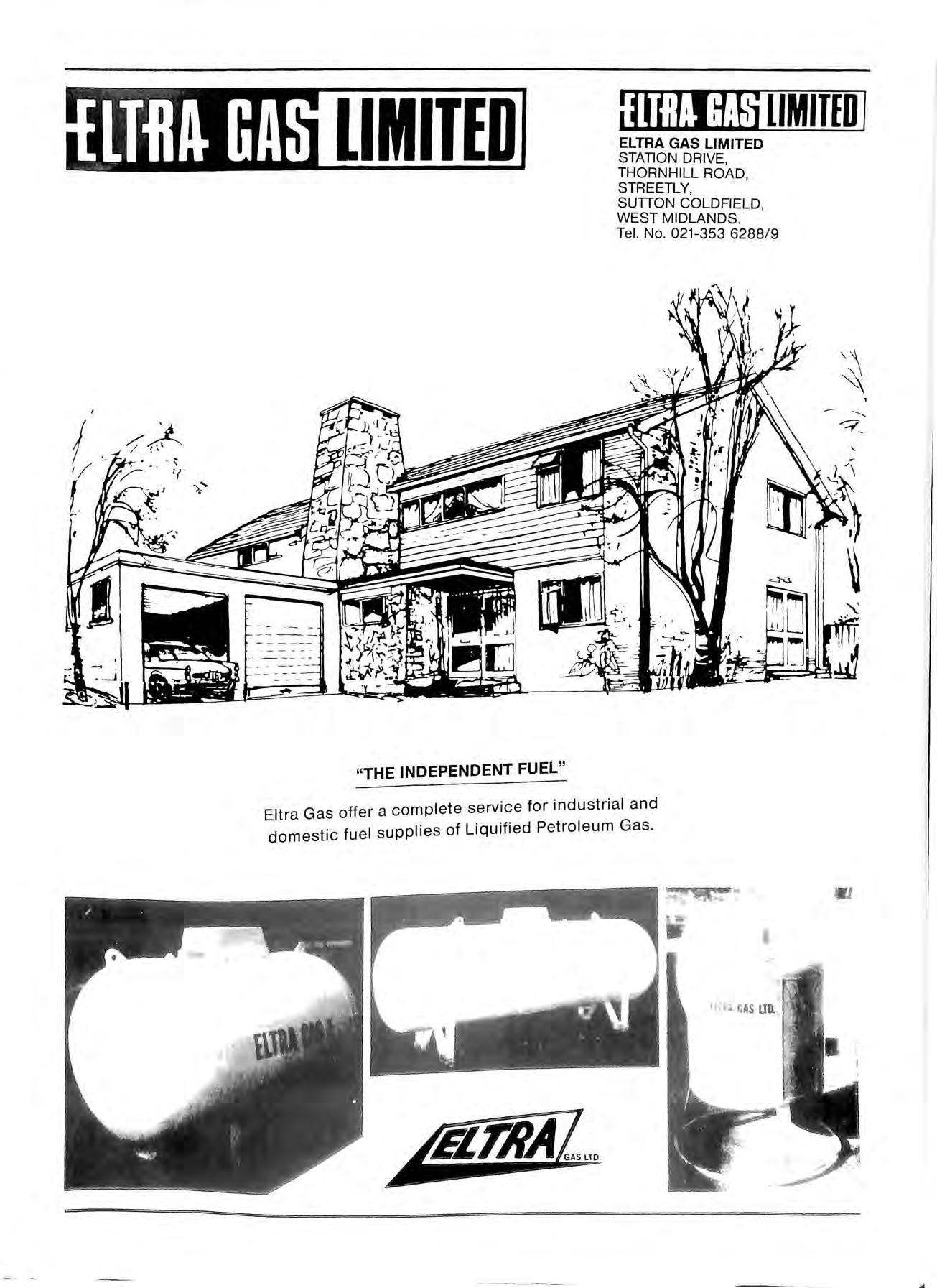
Roncol's Commercial Pump with new or refurbished hydraulics, new frame plastic coated panels, hose and automatic nozzle.
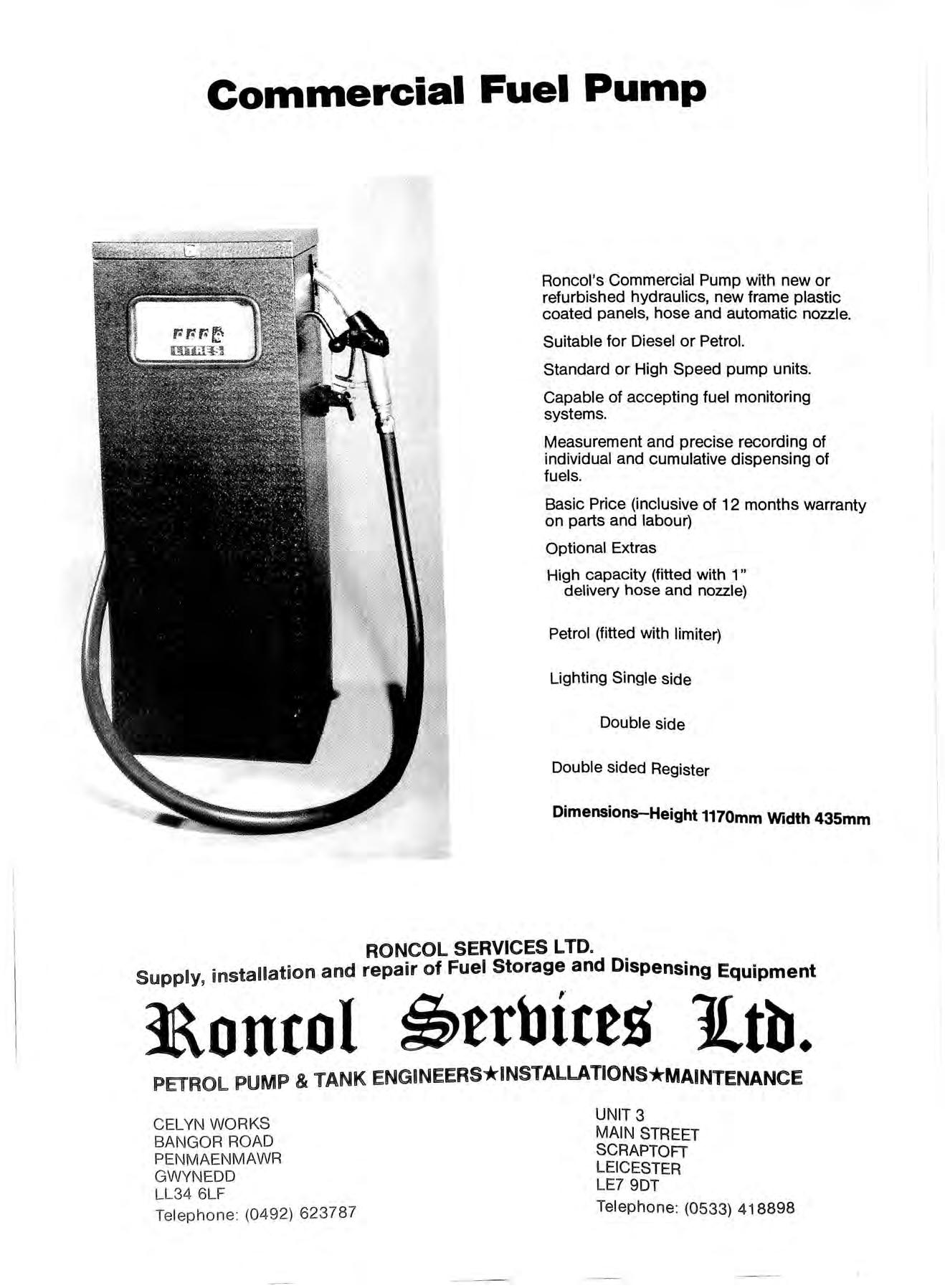
Suitable for Diesel or Petrol.
Standard or High Speed pump units. Capable of accepting fuel monitoring systems.
Measurement and precise recording of individual and cumulative dispensing of fuels.
Basic Price (inclusive of 12 months warranty on parts and labour)
Optional Extras
High capacity (fitted with 1" delivery hose and nozzle)
Petrol (fitted with limiter)
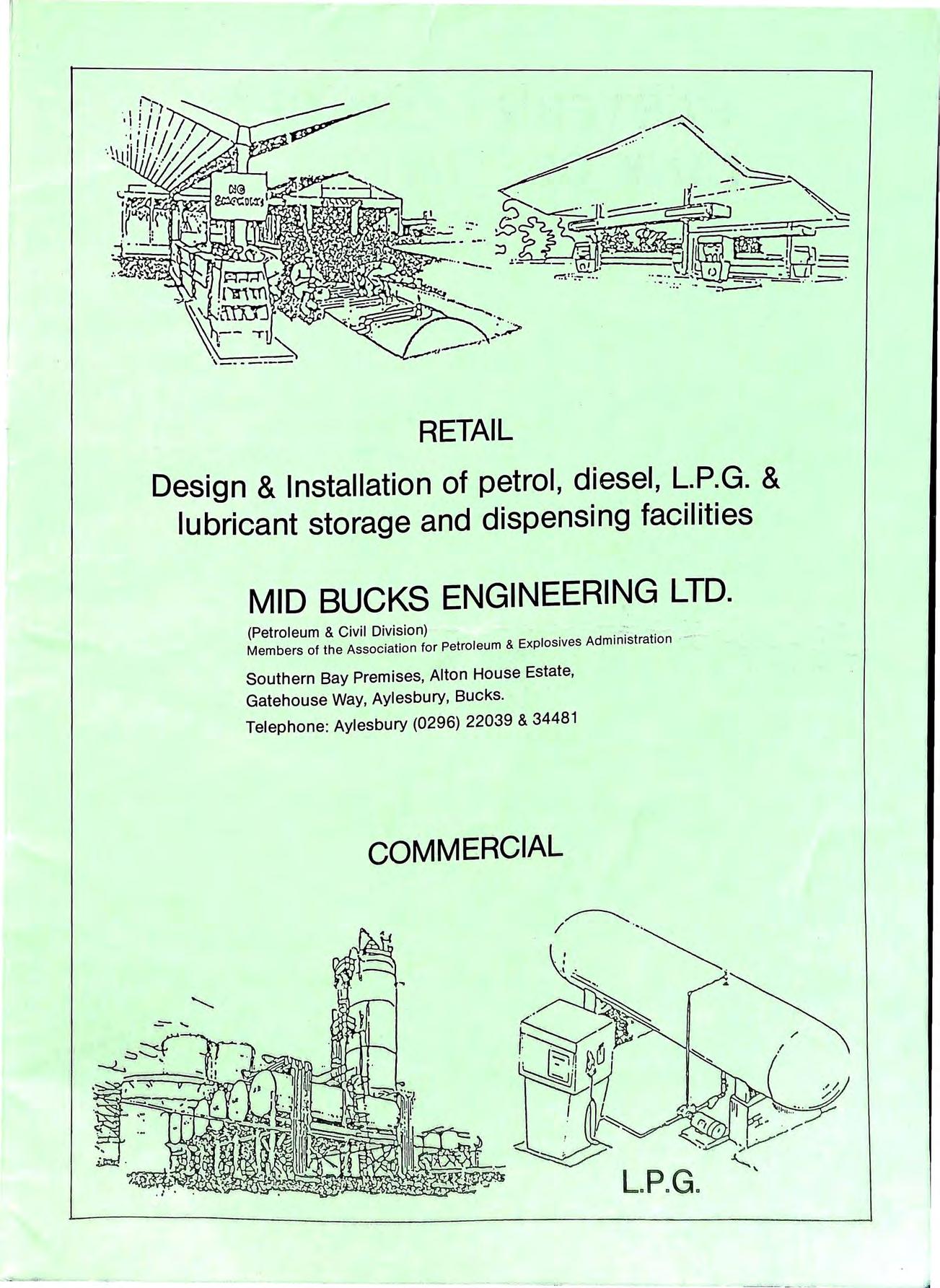
(Petroleum & Civil Division) "' Members of the Association for Petroleum & Explosives Administration
Southern Bay Premises, Alton House Estate, Gatehouse Way, Aylesbury, Bucks. Telephone: Aylesbury (0296) 22039 & 34481
